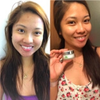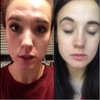Did you know that wrinkles have a scientific name, rhytides? Well, it makes sense that they would; these unattractive creases and folds in the skin have attracted a lot of scientific research. For instance, scientists now understand all the different causes of wrinkles: losing weight, always sleeping in the same position, swimming or bathing for a long time, something called glycation (if you want to get really technical) – and most importantly, aging. They know that age-related wrinkling is hastened by sun exposure, inadequate fluid intake, smoking and other things.

<a href="https://keevaorganics.com/blogs/the-keeva-buzz/reduce-wrinkles-anti-aging-night-cream" target="_blank" rel="noopener"><img class="aligncenter" src="//cdn.shopify.com/s/files/1/1096/2552/files/Gold_organ_oil_winter.jpg?v=1520245236" alt="How to Reduce Wrinkles With Anti-Aging Night Cream [Infographic] | Keeva Organics" /></a>
Scientists have also figured out how to fight wrinkles with compounds like retinol, salicylic acid, glycolic acid, and retinyl acetate, which are all found in an anti-aging night cream. For effective reduction of your own wrinkles, it’s important to understand what these ingredients do, and how – and how not – to use an anti-aging night cream.
Basically, anti-aging night cream increases skin turnover so that old skin cells are replaced by new ones more quickly. This helps to diminish the appearance of not only wrinkles but also age spots and fine lines on the skin. For example, dermatological research has shown that Retin-A, a Vitamin A derivative that’s a prominent ingredient in anti-aging night cream:
- Increases cell turnover
- Stimulates collagen production
- Removes dead cells on the surface to reveal the fresher, younger-looking skin underneath
- Prevents formation of new wrinkles, skin fading and sun damage
- Reduces the risk of skin cancer
- Improves the skin’s feel
Retin-A is the only treatment for wrinkles currently approved by the FDA. It’s exceptionally effective, and doctors and users love the results. When you use anti-aging night cream containing Retin-A, you will notice an improvement in skin appearance no matter how old you are.
How to Use Anti-Aging Night Cream

It goes without saying that anti-aging night cream should only be applied at night. The reason is that vitamin A photosensitizer your skin, i.e., makes it more sensitive to the sun. Applying it at night gives it plenty of time to be absorbed completely into the skin before sunrise. Here are a few more tips on how to use it:
- Apply it only every two to three nights at first. This gives your skin an opportunity to adjust to the cream and helps avoid irritation. After you feel comfortable with it, you can start using it on a daily basis. You should apply it 20 minutes after washing your face, once your face is totally dry.
- Especially if your anti-aging night cream contains Retin-A, apply it in small amounts. Use a pea-sized amount on your face and a little more on your neck. A good technique is to put the cream where you have the most wrinkles or age spots, then massage the excess from there to other parts of your face.
- Because of the drying effects of Retin-A, it’s imperative to combine your anti-aging night cream with a moisturizer. Apply the moisturizer 20 minutes after the anti-aging night cream and make sure it has been fully absorbed into the skin. Moisturize again in the morning after washing your face. Aside from fighting dryness, the moisturizer helps ensure that the anti-aging night cream is evenly distributed all over the face, and its diluent effect reduces irritation.
- Even with a moisturizer, many people will experience some irritation or dryness at the beginning. These reactions are normal, and will decrease with time if you’re using the anti-aging night cream correctly according to the instructions. If you have very sensitive skin, reduce your usage or stop it altogether until your skin recovers, then start building up slowly. Some skin types take longer to adjust than others. Use a mild, non-irritating cleanser when washing your face. It should be all-natural, with no added color or scent. Using a gentle face scrub every once a week will help remove any dead skin.
- The time it takes for noticeable results will differ from one person to another; for some people it might be a week, for others, it might take as long as eight weeks. Don’t give up if it seems to be taking a long time. Anti-aging night cream has been proven to produce results, and it’s a lot gentler on your body than other wrinkle-fighting options like Dysport, Botox, injectable fillers and plastic surgery.
What You Should Avoid

If you have a skin condition like eczema or rosacea, the tendency toward dryness and irritation may be especially troublesome for you, so don’t use an anti-aging night cream containing Retin-A without consulting your dermatologist first.
Don’t use anti-aging night cream containing glycolic acid or benzoyl. These two ingredients are found in many skincare products, but they cause skin dryness themselves, so it’s best to avoid them in combination with Retin-A.
Anti-aging night cream works by helping the skin shed its top layers, which makes skin somewhat thinner and more fragile. Therefore you should not undergo facial waxing when using a Retin-A cream.
Avoid excessive sun exposure. Applying the cream at night help, but your skin will still be more photosensitive than usual. Use a high-SPF sunscreen on a daily basis to protect your skin from the sun’s ultraviolet radiation.
Do not use a Retin-A anti-aging night cream if you are or might be pregnant, or if you are breastfeeding; it has been linked to fetal deformity and other birth defects.
Takeaway
It’s best to get a doctor’s prescription before you start using an anti-aging night cream so you can be sure it’s the right one for you. When you do start, your skin may get worse at first, but it will gradually adjust. If you don’t see any results after two months, you may have to seek alternative wrinkle treatments. But anti-aging night cream has been proven to work for most people. So your anti-aging day cream isn’t working, try an anti-aging night cream before jumping straight to Botox or plastic surgery. You’ll probably love the results!








 Verified Purchase
Verified Purchase


